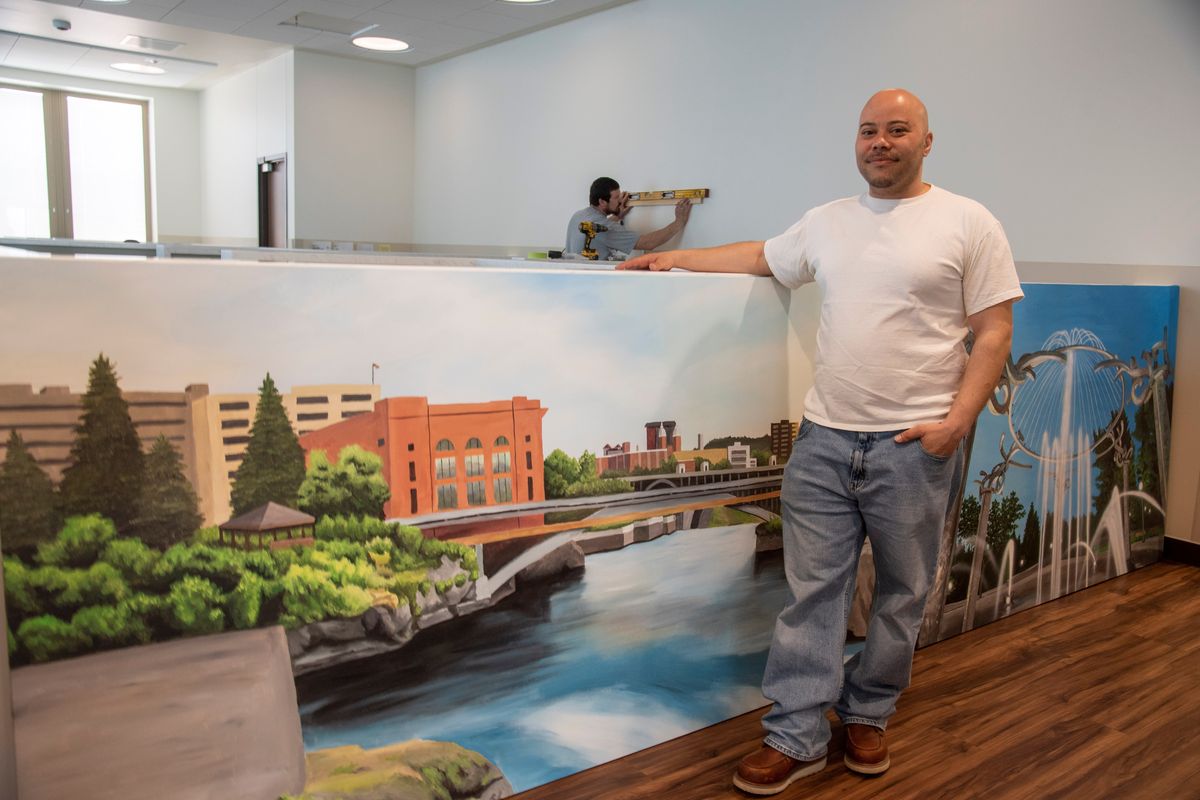‘It’s therapeutic’: Artist formerly in federal prison helps provide art for drug, mental illness stabilization center

Artist Myron Curry spent the weekend putting a dozen large paintings on frames and hanging them inside the Spokane Regional Stabilization Center, which treats people in crises caused by substance abuse or mental illness.
The unassuming brick building on West Gardner Avenue run by Pioneer Human Services is often presented by police officers as a choice to people who are either addicted to illicit substances, having a mental illness episode or both. They’re told they can choose between the stabilization center or jail.
Curry’s paintings, which are mostly either 8 by 4 feet or 8 by 6 feet in size, are bright and colorful. Several feature scenes from downtown Spokane or local animals, including baby deer and moose. One features Native Americans wearing tribal regalia, and the one located in the sally port entrance where new patients arrive includes a rising phoenix.
Curry taught himself to paint while he was serving 15 years in federal prison for intent to possess and distribute controlled substances. He had always been into drawing and was looking for something to do when another inmate let him use his painting supplies. He saw that Curry had talent and when the inmate was released, he gifted Curry his supplies.
“It’s therapeutic,” Curry said.
Curry focused on improving his education, physical fitness and painting skills while he was in prison. When he was released four years ago, he earned a degree in information technology from Seattle Central College and stayed out of trouble. In addition to his art, he does social service work.
“I do a lot of community development and engagement planning with organizations,” he said.
The Regional Stabilization Center opened eight months ago and Dan Sigler, the regional director for Pioneer Human Services, said they wanted to get some art on the walls. Pioneer had worked with Curry before, and Sigler said that Curry had the talent and lived experience to do what they wanted.
“When we developed the program, we really wanted it to be welcoming for people in crisis,” he said.
The secure facility provides mental health counseling and/or substance use disorder treatment services for those entering the jail diversion program. They also help patients develop support and recovery plans and help them find housing. People who successfully complete the program are eligible to have their criminal charges dropped.
“We can provide treatment for the whole person,” Sigler said.
Sigler asked Curry if he could create larger, mural-style paintings for the facility to be hung in the common areas and sleeping area. “We hope it will make it a welcoming, therapeutic facility,” Sigler said. “We want to have a trauma-informed program. The more you can do to keep people calm who are in crisis, the better.”
The only space Curry had that was big enough to work on the large paintings was his bedroom wall, where he would hang the canvases so he could paint.
“My paintings normally aren’t this big,” he said.
By choosing familiar Spokane scenes and wildlife, Curry said he was trying to paint things that were positive and peaceful.
“I try to focus on the impact,” he said. “That’s what drives me.”